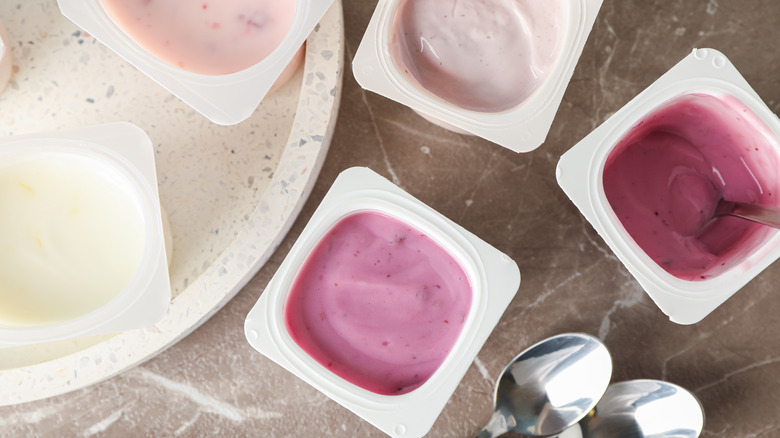5 Foods A Nutritionist Almost Never Eats
What we choose to eat is always first and foremost, a personal choice. Our dietary preferences and needs can vary based on a number of different factors. For some, the choice to refrain from eating certain food items may have to do with wanting to reduce one's risk for certain health conditions. In an exclusive interview with Health Digest, Jamie Feit, MS, RD, and owner of Jamie Feit Nutrition, LLC, shares her expertise and identifies five different food items that she herself chooses not to eat and discusses the various ways in which they can affect the body.
First up is margarine. Made with partially hydrogenated vegetable oil to give margarine its smooth spreadable texture, Feit explains that this results in the formation of trans fatty acids. "Trans fatty acids may increase a person's risk for developing heart disease," she states. "Trans fatty acids also increase inflammatory markers in the body." Rather, Feit says she reaches for butter instead. "My choice is to stick with good old butter! For dairy-free baking I would choose coconut oil. Stick with clean ingredients that are the least processed as possible," she advises.
Hot dogs and white bread
Feit tells Health Digest that she prefers not to eat hot dogs. She explains that hot dogs are formed by taking various animal parts and breaking them down into a paste. Preservatives, sugar, salt, nitrates, and color additives are then mixed in before the product is molded into the log-like shape we see packaged on store shelves. "Preservatives are added to food in order to destroy bacteria," Feit explains. "Can you imagine what those preservatives do to our gut bacteria?" Instead, she opts for meat products with more natural ingredients. "A healthy alternative would be hamburgers, sliders or even kebabs," she states. "Any fun meat that you can eat in a roll or by hand where you actually recognize all the ingredients."
Feit also chooses to steer clear of white bread, which she explains is highly processed. "White bread is made with bleached white flour. This is the worst type of flour because all the healthy nutrients are stripped from it," she says. Pure white bread can also harbor sugar and potentially soybean oil. Such highly-processed foods can increase one's risk for inflammation and obesity, Feit explains. "A healthy substitute for white bread is a sprouted or whole grain bread where you actually can see the whole grains," she states. "It should contain at least 3 grams of fiber. I love Ezekiel bread or Trader Joe's multigrain sandwich thins."
Artificial sweeteners and sugary yogurts
"Regular sweetened yogurt is basically all sugar. It is both the natural sugar from the milk and then the added sugar for the flavor," Feit tells Health Digest. For this reason, sweetened yogurts don't keep us full for very long, she explains. "There are several healthy alternatives," Feit encourages. "Plain Greek yogurt is a fabulous choice as it adds a protein boost which delays the absorption of the natural sugar occurring in the yogurt." But that's not all. "Other good alternatives are Siggis Icelandic yogurt, or coconut yogurt with added probiotics like, cocoyo," Feit suggests. Even better, throw in some delicious berries or crunchy nuts for more added goodness!
Although you may be tempted to reach for non-nutritive, artificial sweeteners as a sugar substitute, Feit doesn't recommend it. "Just because they have no calories that does not mean that they are healthy," she cautions. Feit explains that these products may cause digestive discomfort and can throw our blood sugar levels, microbiome, and metabolism off balance. "My choice of a healthy alternative would be raw honey or regular sugar limited to no more than the recommended daily amount which is 6 teaspoons for women, and 9 teaspoons for men," she offers.
To find out more about healthy eating, visit Feit's website, www.jamiefeitnutrition.com, or connect with her at Jamie@jamiefeitnutrition.com. You can also find her on Instagram, LinkedIn, or Facebook.



